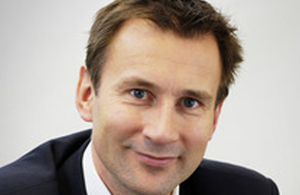New ambition to halve rate of stillbirths and infant deaths
Government announces new commitment to ensure England is one of the safest places in the world to have a baby.

Jeremy Hunt
The Health Secretary, Jeremy Hunt, has announced a new ambition to reduce the rate of stillbirths, neonatal and maternal deaths in England by 50% by 2030.
The number of brain injuries occurring during or soon after birth will also be targeted as part of a new commitment by the government, in partnership with consultants, midwives and other experts across the country to make England one of the safest places to have a baby.
The government will work with national and international experts to ensure that best practice is applied consistently across the NHS and that staff can review and learn from every stillbirth and neonatal death.
Maternity services will be asked to come up with initiatives that can be more widely adopted across the country as part of a national approach – such as appointing maternity safety champions to report to the board and ensuring all staff have the right training to enable them to identify the risks and symptoms of perinatal mental health.
Trusts will receive a share of over £4 million of government investment to buy high-tech digital equipment and to provide training for staff already working to improve outcomes for mums and babies. This includes a £2.24 million fund to help trusts to buy monitoring or training equipment to improve safety, such as cardiotocography (CTG) equipment to monitor babies’ heartbeat and quickly detect problems, or training mannequins that staff can practise emergency procedures on.
A further £500,000 will be invested in developing a new system for staff to review and learn from every stillbirth and neonatal death. The new safety investigation unit will also be asked, once established, to consider a particular focus on maternity cases for its first year.
Over £1 million will be invested in rolling out training packages developed in agreement with the Royal College of Midwives and the Royal College of Obstetricians and Gynaecologists, to make sure staff have the skills and confidence they need to deliver world-leading safe care.
This builds on previous government commitments to invest £75 million in improving perinatal mental health services and ensuring all maternity care is considered as part of ‘Ofsted style’ ratings for commissioners.
Over time this initiative will allow the money spent on caring for injured children or paid as compensation to be re-invested in improved front line services.
Health Secretary Jeremy Hunt said:
The NHS is already a safe place to give birth, but the death or injury of even one new baby or mum is a devastating tragedy which we must do all we can to prevent.
With more support and greater transparency in maternity services across England we will ensure every mother and baby receives the best and safest care, 24 hours a day, 7 days a week – this is at the heart of the NHS values we are backing with funding from a strong economy.
Countries like Sweden are proof that focusing on these issues can really improve safety – with the help of staff on the frontline, we can improve standards here at home.
The ambition is part of a wider government aim to reduce all avoidable harm by 50% and save 6,000 lives by 2017, and it will form a key part of the work of the patient safety campaign Sign up to Safety. The government will align next steps with the Independent Review of Maternity Services’ recommendations, which is already looking at ways to improve quality and safety.
Dr David Richmond, President of the Royal College of Obstetricians and Gynaecologists (RCOG), said:
We support this initiative and our important role in it as leaders of the profession. Good progress has been made but the fact is many of these incidents could be avoided with improvements to the care women and their babies receive.
The RCOG will continue to work closely with our clinical colleagues and the Royal College of Midwives to provide better multi-disciplinary training packages and promote more effective team working, so that this aspect of care can be improved. The challenges of reducing health problems and deaths in mothers and babies due to contributory factors such as smoking, obesity and alcohol also require similar commitment.